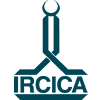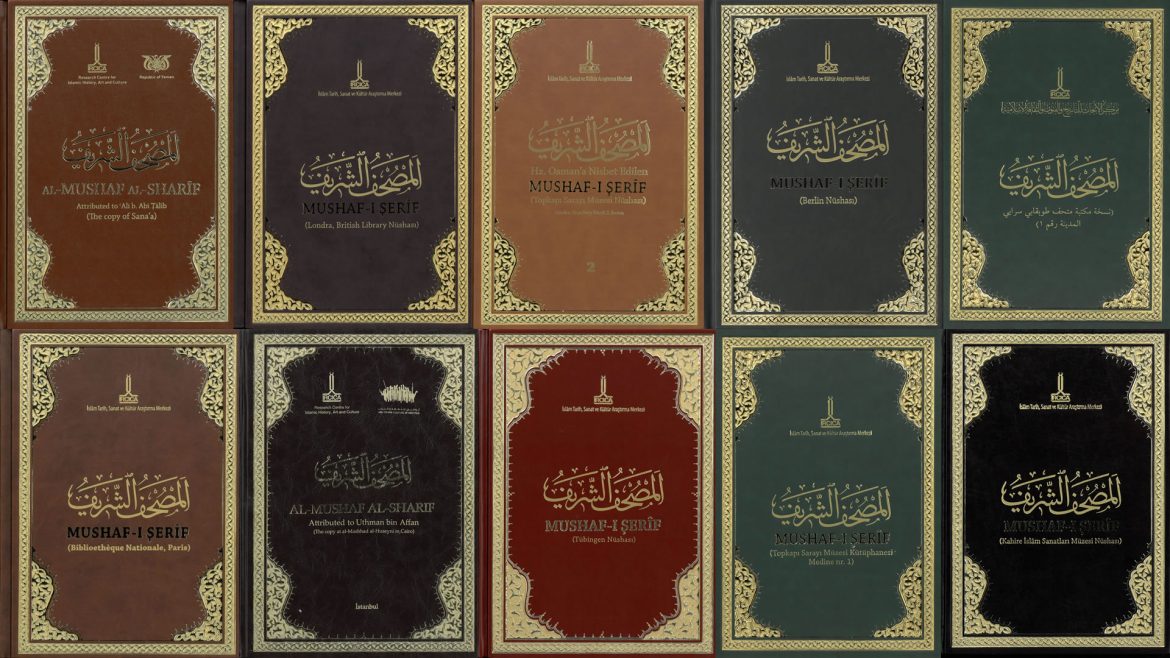The program titled “Studies on the Holy Quran” involves research on the history of the dissemination of the Holy Quran in the world by means of copies and translations of its text.
Studies on copies of the Holy Quran (Mushafs)
The research consists of scholarly and technical studies on copies of the Holy Quran starting from earliest copies, with comparisons of their orthographical and physical aspects. The following publications resulted from this project, to continue with other volumes: the copies attributed to the time of the Third Caliph, Othman bin Affan RA and preserved, respectively, at Topkapı Palace Museum in Istanbul (2007) and the Central Library of Islamic Manuscripts (originally founded as Mashhad al-Husayn) in Cairo (2009); the copy attributed to the time of the Fourth Caliph Ali bin Abi Talib KAW and located in the Manuscripts Library near Sana’a Grand Mosque (2011); the copy attributed to the period of the Third Caliph, Othman bin Affan RA and preserved at the Islamic Arts Museum in Cairo (2014); the partial copy preserved in the National Library of France, Paris (2015); the partial copy at Tubingen University Library, Germany (2016); the partial copy at British Library, London (2017); the copy located at the State Library in Berlin, Germany (2018); an enlarged edition of the study on the Topkapı Palace Museum copy with the addition of later findings, and, a copy attributed to the time of the Third Caliph, Othman bin Affan RA and located in the collection of Fahreddin Pasha (the “Defender of Madina”) at Topkapı Palace Museum, Istanbul (2020).
Studies on translations of the Holy Quran
The objective of the project is to study and record the processes of the diffusion of the text of the Holy Quran throughout the world according to languages, geographical distribution and frequency of translations.
Concerning translations that are in printed form, a World Bibliography of Translations of the Meanings of the Holy Quran – Printed Translations (1515-1980) was published in 1986. It gives information about 2672 works which are the originals, copies and different editions of 551 complete and 883 incomplete translations and selections in 65 languages. The International Islamic Call Society (Tripoli, Libyan Arab Jamahiriya) extended financial assistance for the publication of this bibliography.
A revised and updated edition of this bibliography has been prepared and made accessible to researchers at IRCICA, covering 4329 printed books in 143 languages published during the period from 1515 to 2015. 1671 of them are complete translations.
Concerning translations of the Holy Quran that are in manuscript form, research projects were undertaken to scan the collections of libraries, archives, research institutions and personal collections, collect data, compile and publish bibliographies of those translations. Three volumes have been published by IRCICA in the series World Bibliography of Translations of the Holy Quran in Manuscript Form:
Volume I, translations and exegeses in all languages except Turkish, Persian and Urdu (2000);
Volume II, translations and exegeses in Urdu; prepared with a scholarly Introduction by Dr. Ahmad Khan, expert of manuscript studies and Director of the Centre for the Protection of Arabic Manuscripts, Islamabad, Pakistan (2009);
Volume III, translations and exegeses in Turkish, 2016.
Regarding oral/verbal translations and interpretations of the Holy Quran, IRCICA, in cooperation with local institutions, organized and collected recordings of oral translations in some African languages. The recordings are preserved at IRCICA Library. Thus, translations and interpretations in Wolof were recorded with the assistance of the “Institut Fondamental d’Afrique Noire Cheikh Anta Diop” (IFAN) in Senegal, in 1992, on 25 cassettes of 90 minutes each.
Translations in Tamasheq and Songhay were recorded with the assistance of Ahmed Baba Historical Documentation and Research Centre, Timbuktu, Mali, and its Director Dr. Mahmoud Zouber, who was then representing Mali in the Governing Board of IRCICA. The recording was finalized in 1989, on 44 and 30 cassettes respectively for each language.
Translations in Kanuri were recorded in Nigeria with the cooperation of Open Press publishers in Kaduna, and forwarded to IRCICA in 1995, on 55 cassettes.
IRCICA specializes in technical issues relating to publication of copies of the Holy Quran.
» The 2005 reprint of the historical “Mushaf”-Quran copy of Kazan titled “Kalam Sharif” was coordinated by IRCICA, within the framework of its cooperation with the Municipality of Kazan, capital of Tatarstan Republic, Russian Federation. The original edition, dated 1803, was the first to be printed in the Eastern world. The 2005 edition was published on the occasion of the 1000th anniversary of Kazan City.
» At the instructions of H.H. Sheikh Hamad bin Khalifa al-Thani, Emir of the State of Qatar (currently the Father Emir of Qatar), IRCICA and the Ministry of Awqaf and Islamic Affairs of Qatar worked together during 2007 to coordinate the competition to select the calligrapher for the Qatar copy of the Holy Quran. The copy was written by Mr. Ubayda al-Banki, who came first in the competition. The “Mushaf of Qatar” was published in 2010. The release ceremony was held under the patronage of H.H. Sheikh Tamim bin Hamad Al-Thani, Emir of Qatar, then Deputy Emir and Heir Apparent of the State of Qatar, on 10 March 2010, in Doha.
» “The Mushaf of Fadil-Paša Šerifovi, a copy of the Holy Quran copied by al-Muhagir ad-Dagistani in 1849 and preserved at Gazi Husrevbegova Library in Sarajevo, Bosnia and Herzegovina, was published by IRCICA in a facsimile edition in 2002.
» IRCICA coordinated the technical examination and approval, by the Presidency of Religious Affairs of Turkey, and then published, the copy calligraphed by the late Bosnian professor Ešref Kovaevi, in 1996.






